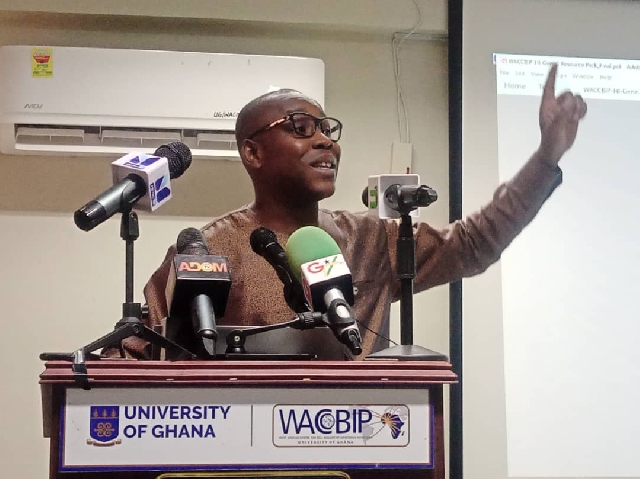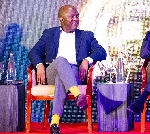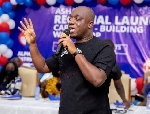UG marks World Hearing Day with a call on Ghanaians to care for the ear
 Mr Andrews Nantogmah speaking at the launch on UG campus
Mr Andrews Nantogmah speaking at the launch on UG campus
The West African Centre for Cell Biology of Infectious Pathogens (WACBIP) at the University of Ghana (UG), Legon, has marked this year’s World Hearing Day with a call on Ghanaians to care for the ear.
The centre is suggesting people who intend to marry should be counselled on deafness to help reduce genetic hearing loss.
According to the centre, some 200,000 people in Ghana are suffering from the condition of hearing loss.
The centre explains that 20 per cent of hearing loss situations in Ghana cannot be explained.
Out of the 80 per cent, 60 per cent of the causes are related to genetics, the centre through research has discovered.
The centre believes that a lot more of the problems of hearing in the country border on superstitions.
Speaking at the launch of the research to mark the day, the Head of the Communications and Public Engagement Unit at WACBIP, Mr Andrew Nantogmah, explained that the celebration of the day was in line with the calendar month of the United Nations (UN).
He said after the centre completed research on the situation of hearing impairment in the country, the centre did not leave the research to gather dust but what it did was move a step further to develop a product in a form of public engagement to benefit the wider society.
According to him, the work the centre has done discovering the genetic cause of hearing impairment is revealing.
"We have developed a public engagement to educate Ghanaians on the causes of deafness.
"In response to the causes, we made two variations of drama for the people who can hear and another one purely for the deaf using sign language.
"Today(Friday) on World Hearing Day, we have come out with a resource package that explains in single terms the genetic causes of deafness in Ghana," he said.
He noted that some genes are responsible for deafness and it was identified that there is a need for people to know some of these genes that cause deafness.
He stressed that before marriage, people need to be counselled about deafness like it is done for Sickle Cell disease to make them aware of the problem to help reduce hearing loss in Ghana.
He said the centre has identified early signs of detecting deafness in children.
Source: Classfmonline.com/cecil Mensah
Trending News

Ursula Owusu-Ekuful defends Akufo-Addo, slams NPP's ingratitude
01:36
E/R: Kwabeng miner vows to protect water bodies
08:49
Youth advocate for reforms in AfCFTA to fight poverty in Africa
09:18
Kwesi Baiden advocates for curriculum reform at Millennium Excellence Awards panel on AI and blockchain
00:49
Police assualt:Afenyo-Markin reports to police CID
10:37
MoH opens admission for nursing and public health training programmes
07:10
‘We should broaden our base in our next reforms’ – Bawumia to NPP
08:11
“We are going to reset Accra” – new AMA Mayor vows bold transformation
03:42
NPP not helping Chief Justice’s course –Political Science lecturer
06:59
Bawumia: 'My early concession was to save Ghana from unnecessary tension'
08:05



